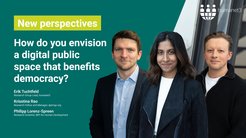New video series: How digital public spaces can strengthen democracy
Experts from law, economics, philosophy, and the social sciences share their visions
Digital public spaces are playing an increasingly central role in democratic discourse. Yet, with the dominance of global social media platforms, core principles such as diversity of opinion, transparency, and participation are coming under growing pressure. Personalized content, algorithmic moderation, and the rapid spread of generative AI content raise the pressing question: Do these digital spaces still promote democratic exchange—or are they undermining it?

To address this question, the interdisciplinary research group humanet3 invited experts from law, economics, philosophy, and the social sciences to a workshop in March 2025. Together, they discussed the state of digital public spheres, their significance for democracy, and how they can be designed to remain viable and democratic in the future.
The outcome of this exchange is a new video series in which selected participants share their perspectives and offer impulses for the further development of digital spaces. In the first episode, Erik Tuchtfeld, Philipp Lorenz-Spreen, and Krisstina Rao respond to the guiding question: How do you envision a digital public space that benefits democracy?
Erik Tuchtfeld, head of the humanet3 research group and research fellow at the Max Planck Institute for Comparative Public Law and International Law, calls for a clear departure from the current dominance of commercial platforms. For him, one thing is clear: if digital public spheres are to be democratically relevant, the rules that apply within them must also be democratically legitimized—a requirement that, in his view, privately run platforms fail to meet. Tuchtfeld sees promise in the so-called Fediverse—a network of decentralized, independent platforms that allow users to define their own rules and live out shared values. These smaller, non-commercial spaces can make diversity visible, enable genuine dialogue, and thereby lay the foundation for a democratic digital community.
Philipp Lorenz-Spreen, researcher at the Max Planck Institute for Human Development and TU Dresden, also emphasizes the need to reform digital spaces for discourse. He argues that they must better reflect the actual diversity of society—many voices, especially those of marginalized groups, still go unheard. Moreover, the quality of information circulating in digital spaces must be made more visible and appropriately rewarded. As it stands, it is often difficult to distinguish between journalistic reporting, scientific assessments, and mere opinion—leading to confusion and a loss of trust. Lorenz-Spreen cites algorithmic transparency as another key element, but also transparency of sources.
Krisstina Rao, Research Fellow and Project Manager at the UCL Institute for Innovation and Public Purpose (IIPP), places particular emphasis on participation. In an increasingly digital society, it is essential to involve all people—including those who have traditionally been underrepresented—in the shaping of digital spaces. Democratic values such as inclusion, transparency, and co-determination must become central to every digital transformation. This requires political processes that actively seek input from the public, for example through inclusive public consultations. Even after the introduction of new technologies, systematic feedback must be gathered to ensure that digital infrastructures continue to evolve in ways that meet the needs of all.
The first videos are now available online, with further contributions from researchers and practitioners to follow in the coming weeks.
humanet3 is an interdisciplinary research initiative that critically accompanies and actively contributes to a human-centered digital transformation—aligned with the European Declaration on Digital Rights and Principles for the Digital Decade. The project is jointly supported by three Max Planck Institutes: the Max Planck Institute for Comparative Public Law and International Law, the Max Planck Institute for Innovation and Competition, and the Max Planck Institute for Human Development.
More information






